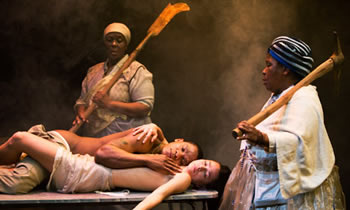HotReview.org Editor's
Picks
Shows Worth Seeing:

Mies Julie
By Yael Farber
Based on Miss Julie by August Strindberg
St. Ann's Warehouse
29 Jay St., Brooklyn
Box office: (718) 254-8779
No play is more securely established as a modern classic than Strindberg’s Miss Julie. A frank, cruel, erotically fraught one-act about a haughty Swedish count’s daughter who sleeps with her father’s valet one Midsummer’s eve, it is habitually described as a masterpiece of Naturalism, even though major parts of it strain credibility. The chief strain is Strindberg’s paranoia about women. The prospect of the liberated “new woman” terrified him, he believed civilization to be threatened by an impending matriarchy, and he thought the public would find all that obvious. In addition, the play’s self-conscious social-Darwinism—pitting a strong rising peasant against an enfeebled aristocrat—comes off as more schematic and polemical than refreshingly candid today. All of which is to say that the playwright Yael Farber, in transposing Strindberg’s story to contemporary South Africa, was extremely wise to rewrite the work from scratch rather than trying to tweak it in yet another light adaptation (a common production choice in our time).
On a homestead called “Weeping Farm” in the Karoo, 18 years after the end of apartheid, Julie is now the daughter of a white landowner and John one of the family’s black domestic servants. The action is set in a servants’ kitchen with fog and twanging string instruments establishing an aura of history-haunted poverty on Freedom Day (the anniversary of Nelson Mandela’s election). Farber concentrates on developing Julie and John’s relationship—they grew up together and maintained the traditional formal distance between races for years despite their simmering attraction—and that firm emotional realism gives the play sturdy plausibility. More important theatrically, the actors Hilda Cronje (Julie) and Bongile Mantasai (John) are extraordinary, generating so much nuanced tension and erotic heat over the 90-minute performance that the audience can hardly look away from them. Farber has transformed the play’s third character, Christine, originally the valet’s fiancé, into John’s mother, who raised Julie after her mother committed suicide, and a fourth character has been added: Ukhokho, a black ancestral ghost who hovers about the edges. Neither older woman amounts to a major presence, though, interestingly enough, as the lovers themselves push their encounter to its horrific end.
That the reasons for the horror include the social politics of post-apartheid South Africa, with its epidemic poverty and entrenched inequality, is the adaptation’s topical hook. Julie and John have as bleak a vision of the future as they would have had under apartheid, and while that impasse is certainly moving, it’s also scarcely less polemical than Strindberg’s social Darwinism. Lines like “This is restitution. Of body and soil” and “You think my body your restitution? My womb your land grab?” rise up and distract like shouted commentaries on the action. None of this diminishes my admiration for Farber's smart and emotionally perceptive work (she’s also the show’s director). Those inclined to dismiss Mies Julie as unnecessarily tendentious should look again at the hallowed source material.
